Division of the EU’s European Commission Used Material Developed by Scott M. Graffius
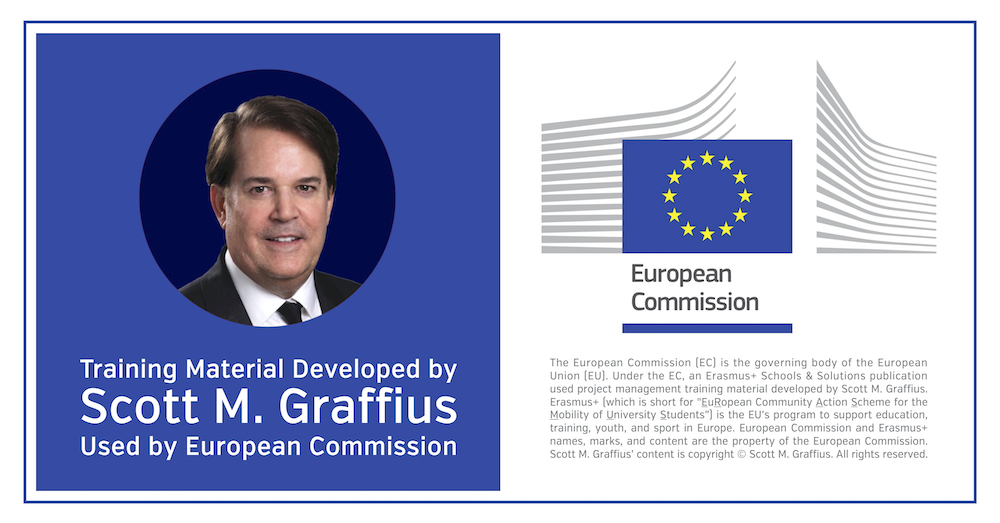

Strategic objectives play a crucial role in guiding organizations towards achieving their vision and mission. They’re fulfilled by projects, endeavors undertaken to create a unique product, service, or result.
The art and science of project management (Agile or otherwise) — the application of knowledge, skills, tools, and techniques to projects — is indispensable for the management and completion of projects. And tools can make a significant contribution to successful outcomes.
In 2007, Scott M. Graffius developed a fresh take on RACI charts, a simple project management tool. His unique material provides audiences with practical information they can use to leverage RACI charts to help manage complexities and achieve success. Graffius periodically refreshes his work. In 2020, he published an updated version on ResearchGate, a European platform for researchers and scientists.
Graffius' respective work is here and citation information follows:
Graffius, Scott M. (2020). How the RACI Tool Can Help You: Use RACI to Establish Roles and Responsibilities—and Improve Outcomes—for Projects and Other Work. Los Angeles, California: Exceptional PPM and PMO Solutions. DOI: 10.13140/RG.2.2.14713.62561/4.
A division of the EU’s European Commission, Erasmus+, used Graffius' material in one of their publications. Their work is here and select visuals follow.
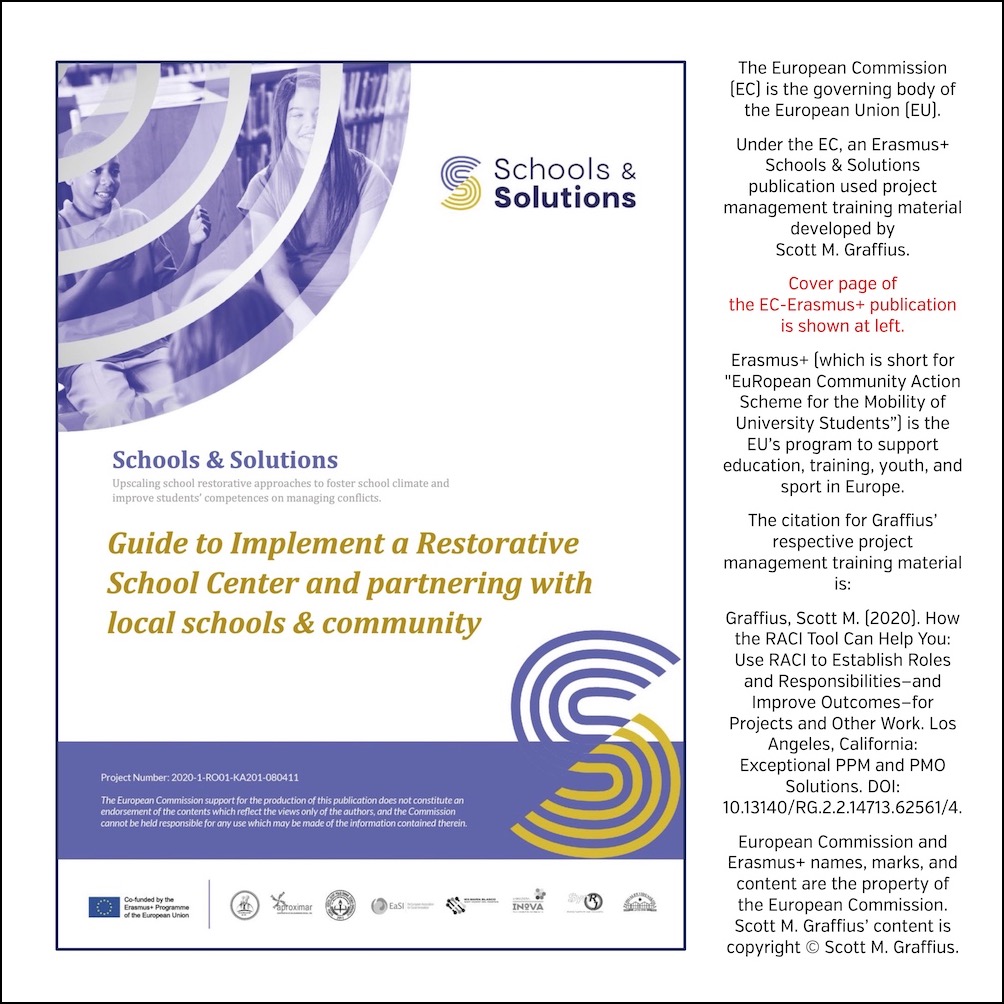
The cover page is shown above.
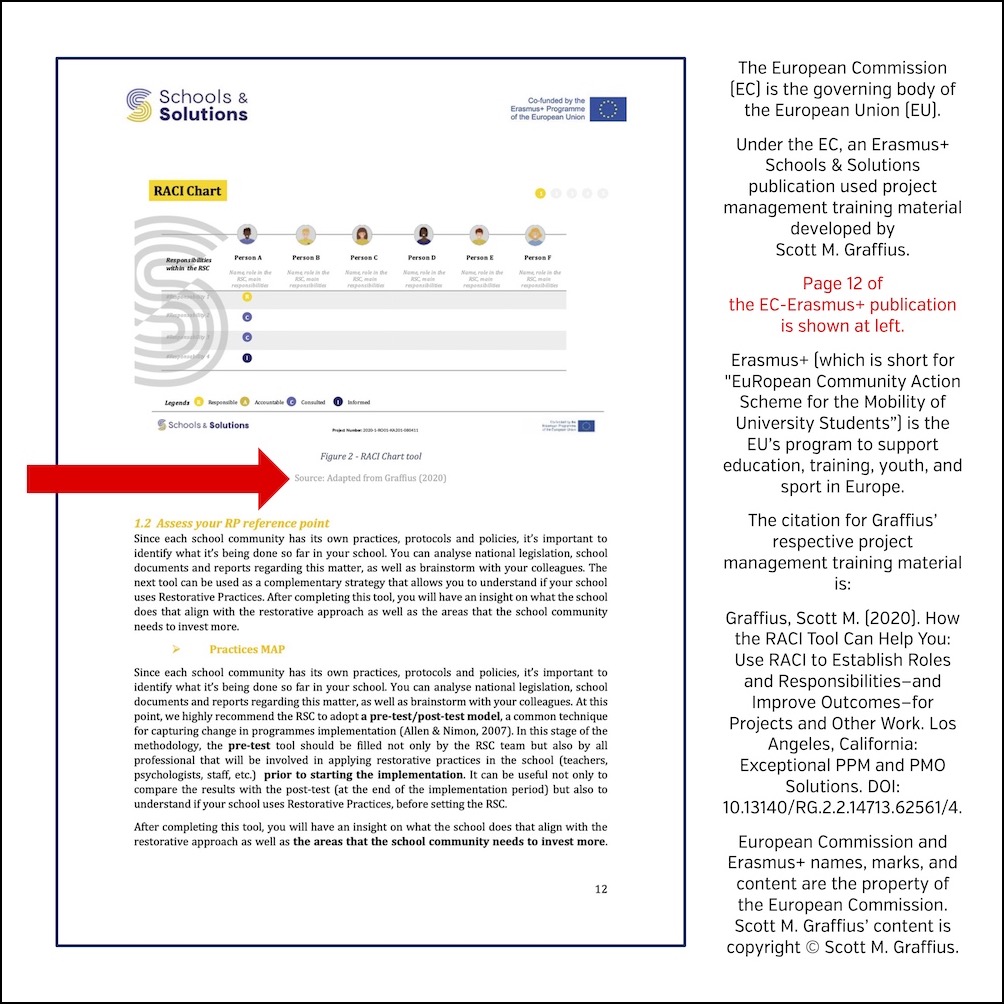
Page 13 is shown above.
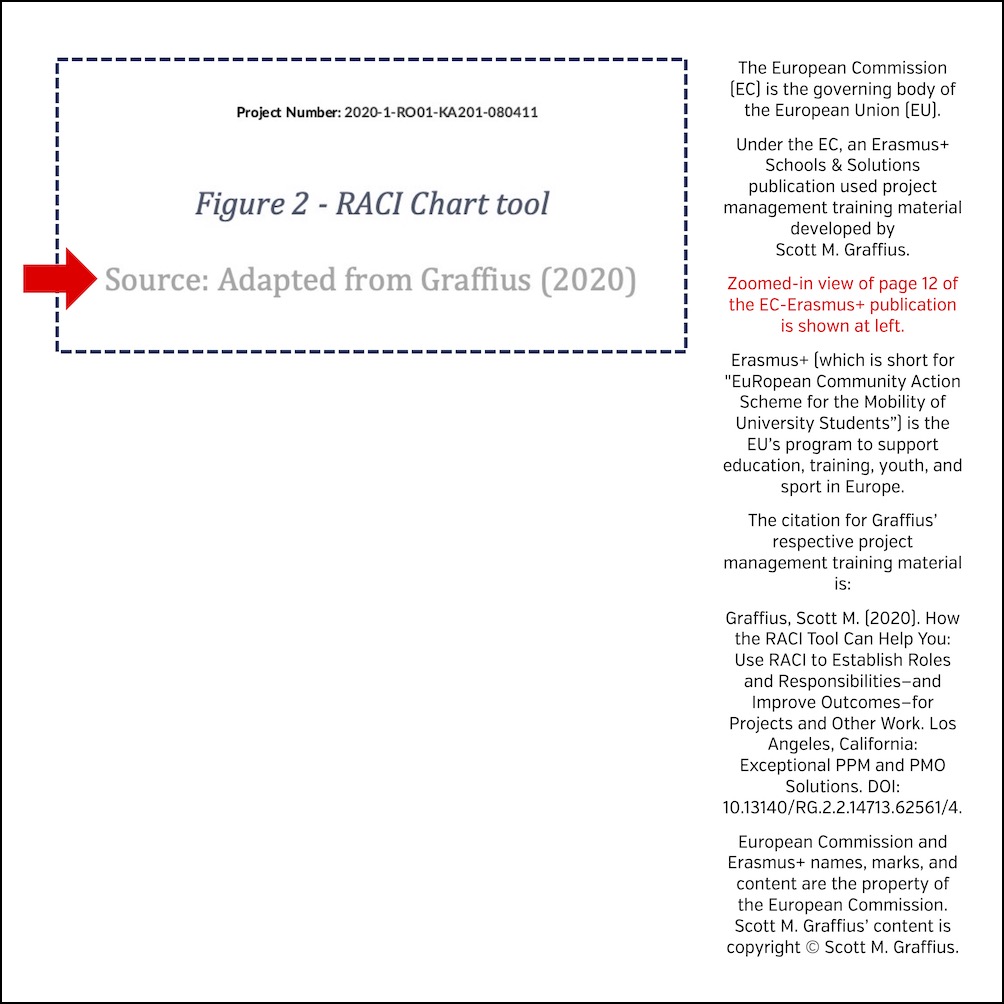
A zoomed-in version visual of page 13 is shown above.
About the European Commission
The European Commission (EC) is the governing body of the European Union (EU). It represents and upholds the interests of the EU as a whole and it is independent of national governments. The EC prepares legislation for adoption by the Council (representing the member countries) and the Parliament (representing the citizens). It administers the budget and the policy programs in cooperation with authorities in the member countries. The EC has an administrative body of about 32,000 European civil servants. Visit https://commission.europa.eu to learn more.
About Erasmus+
Erasmus+ (which is short for "EuRopean Community Action Scheme for the Mobility of University Students") is the European Union’s program to support education, training, youth, and sport in Europe. To learn more, visit https://erasmus-plus.ec.europa.eu.
About ResearchGate
Started in 2008, ResearchGate is a platform for researchers and scientists to connect, collaborate, and share their work. It reports, "Our mission is to connect the world of science and make research open to all." Visit https://www.researchgate.net to learn more.
How to Cite This Article
Graffius, Scott M. (2024, April 1). Division of the EU’s European Commission Used Material Developed by Scott M. Graffius. Available at: https://scottgraffius.com/blog/files/eu-2024.html. DOI: 10.13140/RG.2.2.23115.40488.




About Scott M. Graffius

Scott M. Graffius, PMP, SA, CSP-SM, CSP-PO, CSM, CSPO, ITIL, LSSGB is an agile project management practitioner, consultant, thinker, creator, multi-award-winning author, and international public speaker. Founder and CEO of Exceptional PPM and PMO Solutions™ and subsidiary Exceptional Agility™, he has generated over $1.9 billion for Global Fortune 500 businesses and other organizations he has served. Graffius and content from his books, talks, workshops, and more have been featured and used by Microsoft, Oracle, Broadcom, Cisco, Gartner, Project Management Institute, IEEE, National Academy of Sciences, United States Department of Energy, Yale University, Tufts University, and others. He delights audiences with dynamic and engaging talks and workshops on agile project management, AI, Tech leadership, video game development, strategic alignment, the science of high performance teams, and more. To date, he's presented sessions at 89 conferences and other events across 25 countries.
His full bio is available here.
Connect with Scott on:
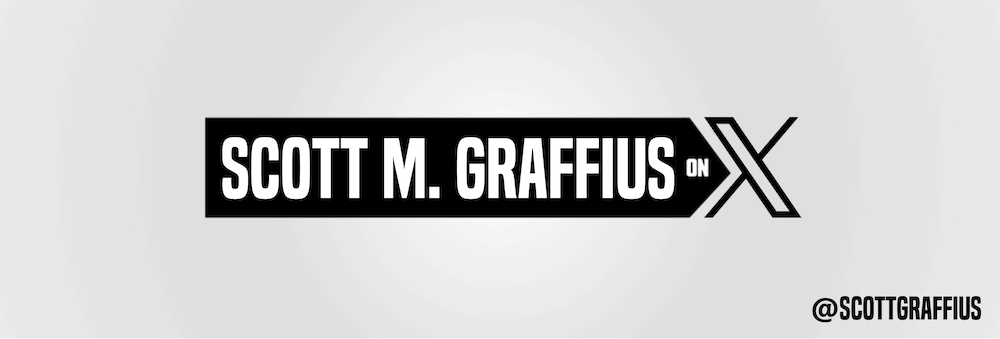
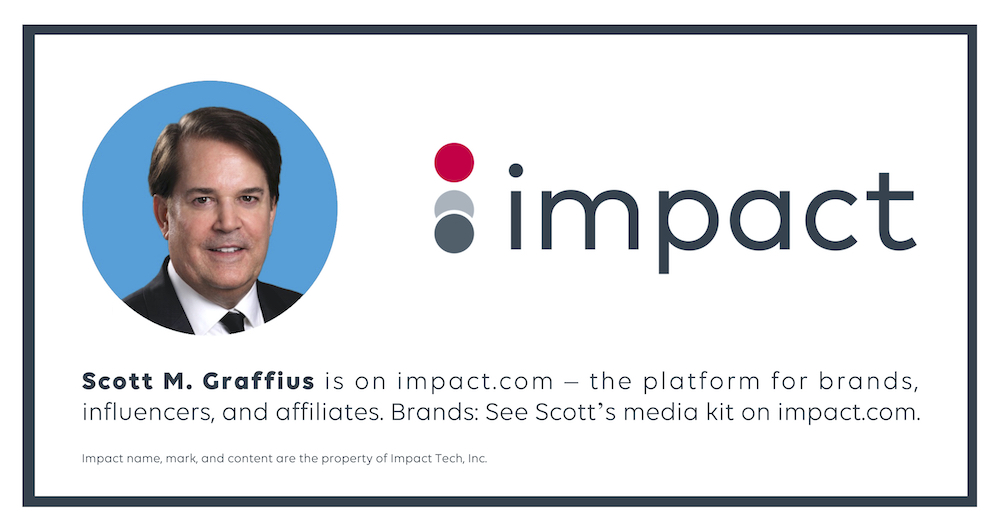

About Agile Scrum: Your Quick Start Guide with Step-by-Step Instructions
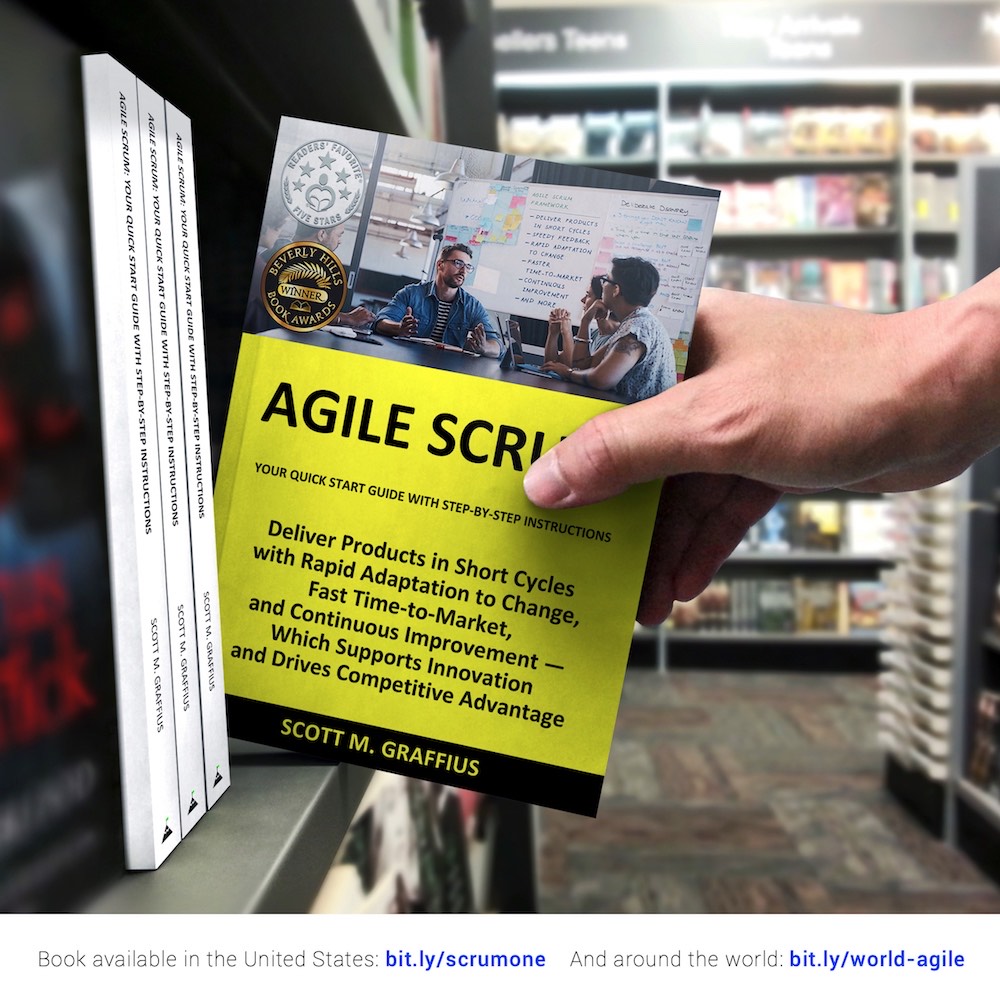
Shifting customer needs are common in today's marketplace. Businesses must be adaptive and responsive to change while delivering an exceptional customer experience to be competitive.
There are a variety of frameworks supporting the development of products and services, and most approaches fall into one of two broad categories: traditional or agile. Traditional practices such as waterfall engage sequential development, while agile involves iterative and incremental deliverables. Organizations are increasingly embracing agile to manage projects, and best meet their business needs of rapid response to change, fast delivery speed, and more.
With clear and easy to follow step-by-step instructions, Scott M. Graffius's award-winning Agile Scrum: Your Quick Start Guide with Step-by-Step Instructions helps the reader:
- Implement and use the most popular agile framework―Scrum;
- Deliver products in short cycles with rapid adaptation to change, fast time-to-market, and continuous improvement; and
- Support innovation and drive competitive advantage.
Hailed by Literary Titan as “the book highlights the versatility of Scrum beautifully.”
Winner of 17 first place awards.
Agile Scrum: Your Quick Start Guide with Step-by-Step Instructions is available in paperback and ebook/Kindle in the United States and around the world. Some links by country follow.
- 🇧🇷 Brazil
- 🇨🇦 Canada
- 🇨🇿 Czech Republic
- 🇩🇰 Denmark
- 🇫🇮 Finland
- 🇫🇷 France
- 🇩🇪 Germany
- 🇬🇷 Greece
- 🇭🇺 Hungary
- 🇮🇳 India
- 🇮🇪 Ireland
- 🇮🇱 Israel
- 🇮🇹 Italy
- 🇯🇵 Japan
- 🇱🇺 Luxembourg
- 🇲🇽 Mexico
- 🇳🇱 Netherlands
- 🇳🇿 New Zealand
- 🇳🇴 Norway
- 🇪🇸 Spain
- 🇸🇪 Sweden
- 🇨🇭 Switzerland
- 🇦🇪 UAE
- 🇬🇧 United Kingdom
- 🇺🇸 United States

About Agile Transformation: A Brief Story of How an Entertainment Company Developed New Capabilities and Unlocked Business Agility to Thrive in an Era of Rapid Change
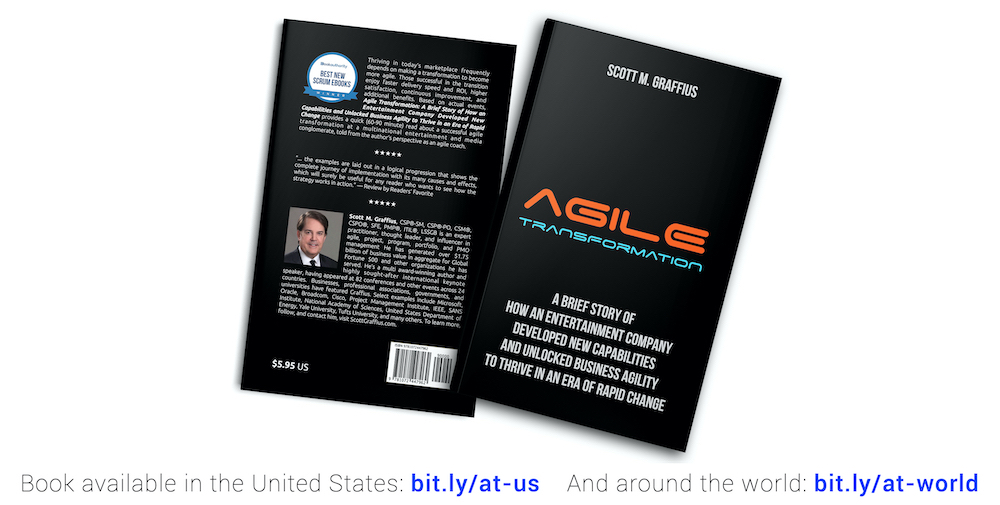
Thriving in today's marketplace frequently depends on making a transformation to become more agile. Those successful in the transition enjoy faster delivery speed and ROI, higher satisfaction, continuous improvement, and additional benefits.
Based on actual events, Agile Transformation: A Brief Story of How an Entertainment Company Developed New Capabilities and Unlocked Business Agility to Thrive in an Era of Rapid Change provides a quick (60-90 minute) read about a successful agile transformation at a multinational entertainment and media company, told from the author's perspective as an agile coach.
The award-winning book by Scott M. Graffius is available in paperback and ebook/Kindle in the United States and around the world. Some links by country follow.
- 🇦🇺 Australia
- 🇦🇹 Austria
- 🇧🇷 Brazil
- 🇨🇦 Canada
- 🇨🇿 Czech Republic
- 🇩🇰 Denmark
- 🇫🇮 Finland
- 🇫🇷 France
- 🇩🇪 Germany
- 🇬🇷 Greece
- 🇮🇳 India
- 🇮🇪 Ireland
- 🇯🇵 Japan
- 🇱🇺 Luxembourg
- 🇲🇽 Mexico
- 🇳🇱 Netherlands
- 🇳🇿 New Zealand
- 🇪🇸 Spain
- 🇸🇪 Sweden
- 🇨🇭 Switzerland
- 🇦🇪 United Arab Emirates
- 🇬🇧 United Kingdom
- 🇺🇸 United States

The short link for this article is: https://bit.ly/eu-2024
© Copyright 2024 Scott M. Graffius. All rights reserved. This material may not be published, broadcast, rewritten or redistributed without the express written permission of Scott M. Graffius.

‘Comparative Methodological Guidelines: Handbook for Educators’ Violates Scott M. Graffius’ Copyright
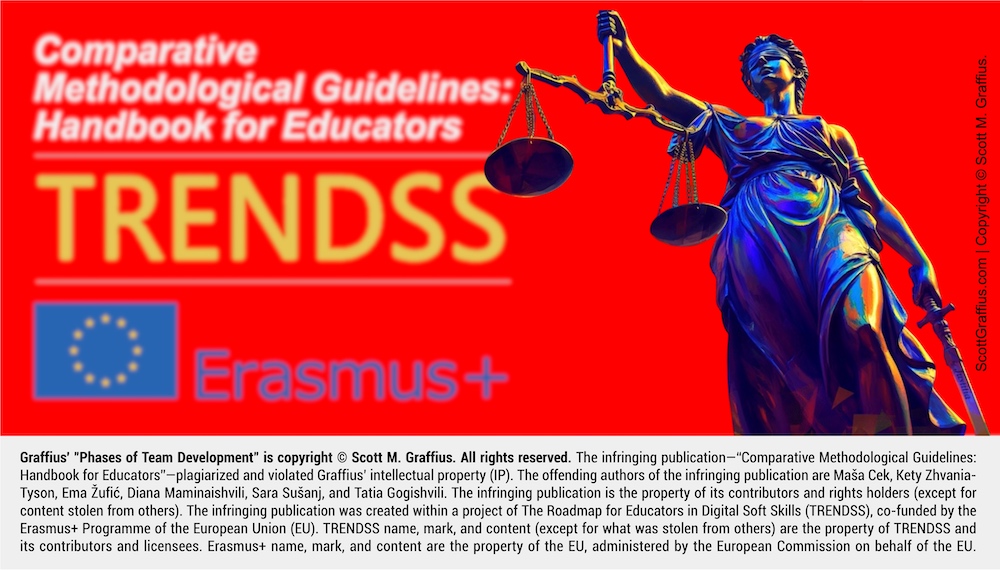

If there's an update after this article is published, the information will appear in the Post-Publication Notes section.

Scott M. Graffius' 'Phases of Team Development' Copyrighted Property
Informed by the research of Bruce W. Tuckman and Mary Ann C. Jensen, over 100 subsequent studies, and Scott M. Graffius' first-hand professional experience with, and analysis of, team leadership and performance, Graffius created his ‘Phases of Team Development’ as a unique perspective and visual conveying the five phases of team development — Forming, Storming, Norming, Performing, and Adjourning — inclusive of a graph showing how performance varies by phase, as well as the characteristics and strategies for each phase.
Graffius' intellectual property (IP) is registered with the United States Copyright Office.
Graffius initially developed his ‘Phases of Team Development’ unique material in 2008, and he periodically refreshes it.
For reference, the visual from the edition applicable to this case (4 January 2021 edition) is shown below [Exhibit 1] and is available at: https://dx.doi.org/10.13140/RG.2.2.22040.42246. The integrated text applies.
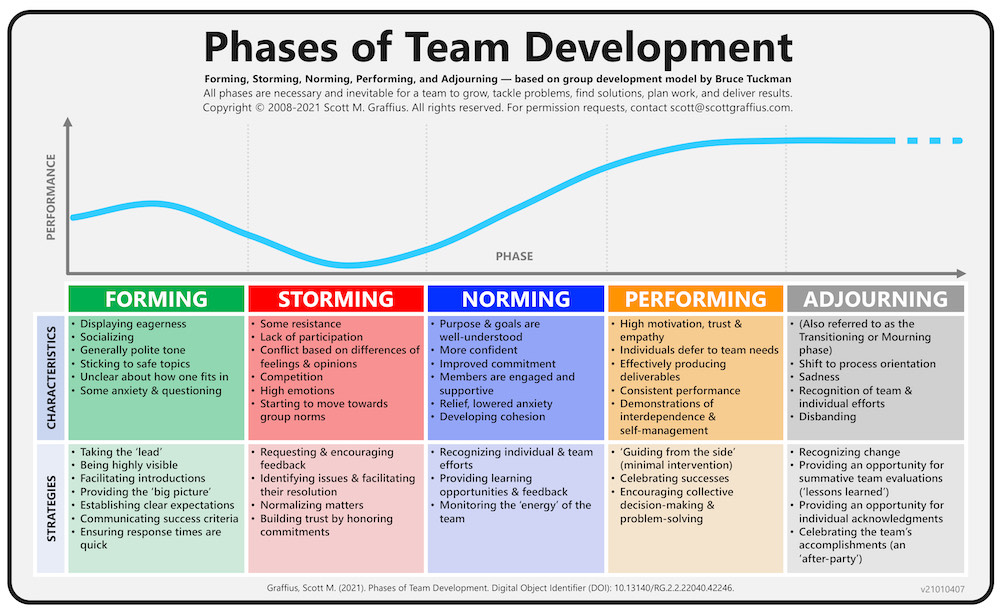
As shown above, Graffius’ copyright ownership details are integrated into and appear on his copyrighted property. Specifically, it reads: “Copyright © 2008-2021 Scott M. Graffius. All rights reserved. For permission requests, contact scott@scottgraffius.com.”
Organizations around the world engage Graffius to deliver compelling talks and workshops. To date, he's presented sessions at 91 conferences and other events across 25 countries, including:
- Armenia,
- Australia,
- Brazil,
- Canada,
- Czech Republic,
- Finland,
- France,
- Germany,
- Greece,
- Hong Kong,
- Hungary,
- India,
- Ireland,
- Lithuania,
- Luxembourg,
- Nepal,
- Netherlands,
- New Zealand,
- Norway,
- Romania,
- Sweden,
- Switzerland,
- United Arab Emirates,
- United Kingdom,
- and the United States.

Graffius ‘Phases of Team Development’ IP is central and key to many of those sessions. His rate card and a listing of his engagements are at https://scottgraffius.com/resources/Exceptional-PPM-and-PMO-Solutions-Rate-Card-for-2024-2025-v24071607.pdf and https://scottgraffius.com/publicspeaker.html, respectively.
With an authorization/license from Graffius, his ‘Phases of Team Development’ IP is featured and used by businesses, professional associations, government agencies, and universities around the world. Examples include:
- Adobe,
- American Management Association,
- Amsterdam Public Health Research Institute,
- Bayer,
- Boston University,
- Broadcom,
- Cisco,
- Deimos Aerospace,
- DevOps Institute,
- Ford Motor Company,
- Hasso Plattner Institute,
- IEEE,
- Johns Hopkins University,
- LeadingEng,
- London South Bank University,
- Manufacturers Alliance,
- Microsoft,
- New Zealand Government,
- Oracle,
- TBS Switzerland,
- Torrens University Australia,
- U.S. National Park Service,
- U.S. Tennis Association,
- UC San Diego,
- UK Sports Institute,
- University of Galway Ireland,
- Virginia Tech,
- Warsaw University,
- Yale University,
- and many others.
Copyrights protect the intellectual property rights of creators, ensuring they receive recognition and compensation for their work, thus incentivizing creativity and innovation. Graffius is vigilant in upholding, protecting and enforcing his copyrights and other IP rights.

Comparative Methodological Guidelines: Handbook for Educators Violates Scott M. Graffius’ Copyright
Here's information on the infringing publication:
- Title of infringing publication: Comparative Methodological Guidelines: Handbook for Educators
- Authors of infringing publication: Maša Cek, Kety Zhvania-Tyson, Ema Žufić, Diana Maminaishvili, Sara Sušanj, and Tatia Gogishvili
- Infringing publication was created within the project: The Roadmap for Educators in Digital Soft Skills (TRENDSS)
- Infringing publication was co-funded by: Erasmus+ Programme of the European Union
- Known location(s) of the infringing publication: https://trendss.eu/wp-content/uploads/2021/06/Comparative-Methodological-Guidelines-Handbook-for-Digital-Educators.pdf
Details, including indisputable proof of the violation, are reported next.
Again, Graffius’ copyright ownership details and permission request information are integrated into and appear on his intellectual property.
The authors (Maša Cek, Kety Zhvania-Tyson, Ema Žufić, Diana Maminaishvili, Sara Sušanj, and Tatia Gogishvili) of Comparative Methodological Guidelines: Handbook for Educators did not request nor receive permission to use Graffius’ copyrighted property.
Nevertheless, the authors used Graffius’ 4 January 2021 copyrighted property in their publication.
Exhibit 2 is below. It shows thumbnail images of pages 1, 2, 73, 75, 77, 78, 80, and 89 from the infringing publication.

Comparing Graffius' copyrighted 4 January 2021 'Phases of Team Development' intellectual property with Comparative Methodological Guidelines reveals that Comparative Methodological Guidelines violated Graffius' copyright. There are too many examples to list, but some follow.
The infringing publication used Graffius’ copyrighted property on the characteristics and strategies for the phases of team development word-for-word. Here are some examples:
🟢 Graffius’ copyrighted Phases of Team Development has this content: "Some resistance"
🔴 Infringing Comparative Methodological Guidelines has this material: "Some resistance"
🟢 Graffius’ copyrighted Phases of Team Development has this content: "Lack of participation"
🔴 Infringing Comparative Methodological Guidelines has this material: "Lack of participation"
🟢 Graffius’ copyrighted Phases of Team Development has this content: "Requesting & encouraging feedback"
🔴 Infringing Comparative Methodological Guidelines has this material: "Requesting and encouraging feedback"
🟢 Graffius’ copyrighted Phases of Team Development has this content: "Identifying issues & facilitating their resolution"
🔴 Infringing Comparative Methodological Guidelines has this material: "Identifying issues and facilitating their resolutions"
🟢 Graffius’ copyrighted Phases of Team Development has this content: "Building trust by honoring commitments"
🔴 Infringing Comparative Methodological Guidelines has this material: "Building trust by honouring commitments"
🟢 Graffius’ copyrighted Phases of Team Development has this content: "Sadness"
🔴 Infringing Comparative Methodological Guidelines has this material: "Sadness"
Additionally the infringing publication used Graffius’ copyrighted property on the characteristics and strategies for the phases of team development with slight re-wording (which, in context, is still infringement). Here are some examples:
🟢 Graffius’ copyrighted Phases of Team Development has this content: "More confident"
🔴 Infringing Comparative Methodological Guidelines has this material: "Confidence is high"
🟢 Graffius’ copyrighted Phases of Team Development has this content: "Improved commitment"
🔴 Infringing Comparative Methodological Guidelines has this material: "High commitment"
The indisputable proof shows that the infringing publication used Graffius' copyrighted property.
The authors used Graffius' material but did not attribute the material to him through citation in-line (in pages 73, 75, 77, 78, 80, and 89 of the infringing publication), or in the references and resources section (page 89 of the infringing publication) or otherwise. Through their actions or failure to act, the authors are wrongly leading others to falsely believe that they (or others) are the author and owner of Graffius’ respective copyrighted content.
Additionally, the authors made their violation of Graffius’ intellectual property even worse by marking page 2 of their infringing publication with the following (with hyperlink): "Attribution 4.0 International (CC BY 4.0)" — where the link is https://creativecommons.org/licenses/by/4.0/. At the preceding link, Creative Commons specifies that CC BY 4.0 means that: "You are free to: Share — copy and redistribute the material in any medium or format for any purpose, even commercially. Adapt — remix, transform, and build upon the material for any purpose, even commercially." Again, the authors do not have any rights to Graffius' intellectual property. By the marking the infringing document with "Attribution 4.0 International (CC BY 4.0)," the authors are falsely informing and instructing readers that anyone can freely copy and redistribute or adapt Graffius' copyrighted property in any medium or format for any purpose, even commercially. That's egregious, appalling, and destructive.
So long as the infringing publication exists in any language or form, it continues to spread misinformation and violate Graffius’ intellectual property.

Conclusion
Again, Graffius’ copyright ownership details and permission request information are integrated into and appear on his intellectual property.
Authors (Maša Cek, Kety Zhvania-Tyson, Ema Žufić, Diana Maminaishvili, Sara Sušanj, and Tatia Gogishvili) of Comparative Methodological Guidelines: Handbook for Educators did not request nor receive permission to use Graffius’ copyrighted property.
Nevertheless, the authors used Graffius’ 4 January 2021 copyrighted property in their publication.
The authors used a material volume of Graffius’ copyrighted property.
The authors used Graffius' copyrighted property word-for-word and also with slight re-wording (which is still a violation).
The authors did not attribute their use of Graffius' copyrighted property to Graffius through citation or otherwise. Through their actions or failure to act, the authors are wrongly leading others to falsely believe that they (or others) are the author and owner of Graffius’ respective copyrighted content.
Could it possibly get worse? Unfortunately, yes. The authors marked page 2 of their infringing publication with the following (with hyperlink): "Attribution 4.0 International (CC BY 4.0)" — where the link is https://creativecommons.org/licenses/by/4.0/. At the preceding link, Creative Commons specifies that CC BY 4.0 means that: "You are free to: Share — copy and redistribute the material in any medium or format for any purpose, even commercially. Adapt — remix, transform, and build upon the material for any purpose, even commercially." Again, the authors do not have any rights to Graffius' intellectual property. By the marking the infringing document with "Attribution 4.0 International (CC BY 4.0)," the authors are falsely informing and instructing readers that anyone can freely copy and redistribute or adapt Graffius' copyrighted property in any medium or format for any purpose, even commercially. That's egregious, appalling, and destructive.
So long as the infringing publication exists in any language or form, it continues to spread misinformation and violate Graffius’ intellectual property.
The authors damaged the marketability and value of Graffius’ copyrighted property.
For the aforementioned reasons, the authors’ use of Graffius’ copyrighted property was not ‘fair use’ nor ‘fair dealing’ nor otherwise allowed.
The actions of the authors are a disgraceful breach of professional ethics, moral standards, and Graffius’ intellectual property rights.
The publisher must immediately implement the following three (3) actions:
- Remove the Infringing Material. Electronic Versions: Immediately remove the infringing material from digital platforms where it is advertised, promoted, sold, or distributed; this includes removing or disabling any online access to it. Physical Copies: If physical copies of the material are in inventory or circulation, stop further distribution; recall any copies already distributed.
- Issue a Retraction. Publish a formal retraction notice acknowledging the infringement and the steps taken to rectify the situation. The notice will present the facts as they are—the notice will not "spin" or "downplay" the infringement. The notice is to be clearly visible and accessible.
- Notify Relevant Parties. Subscribers and Purchasers and other Recipients: Inform the respective subscribers, purchasers, or recipients of the material about the retraction, ensuring transparency about the issue; again, the notice will present the facts as they are—the notice will not "spin" or "downplay" the infringement. Indexes and Databases: Notify any databases or indexing services that list the material so they can update their records accordingly.
Graffius maintains, enforces, and protects his copyright and other intellectual property rights. He reserves his rights in this disturbing and consequential matter.
If there's an update after this article is published, the information will appear in the Post-Publication Notes section.

About the Erasmus+ Programme of the European Union
The Erasmus+ Programme, funded by the European Union, is a flagship initiative designed to enhance education, training, youth, and sports across Europe and beyond. Established as a successor to various EU programs, it aims to promote mobility, cooperation, and skills development among individuals and institutions. Erasmus+ supports a wide array of activities including student and staff exchanges, traineeships, and various collaborative projects. Since its inception, it has impacted millions of participants, contributing significantly to cultural exchange and lifelong learning across different sectors of society.
To learn more about the Erasmus+ Programme, visit its website.

About Scott M. Graffius

Scott M. Graffius is a global leader in agile project management, an expert on teamwork tradecraft, an authority on temporal dynamics on social media platforms, a creator, a consultant, a trainer, an award-winning author, and an international public speaker.
See his bio to learn more.









Post-Publication Notes
As an overview:
Graffius' "Phases of Team Development" is copyright © Scott M. Graffius. All rights reserved. The infringing publication—"Comparative Methodological Guidelines: Handbook for Educators"—plagiarized and violated Graffius’ intellectual property (IP). The offending authors of the infringing publication are Maša Cek, Kety Zhvania-Tyson, Ema Žufić, Diana Maminaishvili, Sara Sušanj, and Tatia Gogishvili. The infringing publication is the property of its contributors and rights holders (except for content stolen from others). The infringing publication was created within a project of The Roadmap for Educators in Digital Soft Skills (TRENDSS), co-funded by the Erasmus+ Programme of the European Union (EU). TRENDSS name, mark, and content (except for what was stolen from others) are the property of TRENDSS and its contributors and licensees. Erasmus+ name, mark, and content are the property of the EU, administered by the European Commission on behalf of the EU.
Update on 29 October 2024
Graffius informed the offending authors and related organizations of the infringement via email on 29 October 2024. He also notified the EU's European Commission of the violation; it provided an auto-reply via email, titled "Your request #4765781 was received." Except for that auto-reply, there was no response. The offending authors did not respond or take action. The respective organizations did not respond or take action.
Update on 1 January 2025
To date, The infringing publication remains online. By not removing the infringing publication, the offenders willfully continue to spread misinformation and violate Graffius' intellectual property rights.
Update on 1 January 2026
To date, The infringing publication remains online. By not removing the infringing publication, the offenders willfully continue to spread misinformation and violate Graffius' intellectual property rights.


How to Cite This Article
Graffius, Scott M. (2024, October 8). ‘Comparative Methodological Guidelines: Handbook for Educators’ Violates Scott M. Graffius’ Copyright. Available at: https://scottgraffius.com/blog/files/cmg-eu-ec-publication-infringes-on-copyright-of-scott-m-graffius.html. DOI: 10.13140/RG.2.2.29872.78085.


Content Acknowledgements
This article uses limited excerpts from Comparative Methodological Guidelines: Handbook for Educators, attributed to Comparative Methodological Guidelines: Handbook for Educators and used under fair use for news reporting and analysis. Names, marks, and content are the property of their respective owners.


Copyright
Copyright © Scott M. Graffius. All rights reserved.
Content on this site—including text, images, videos, and data—may not be used for training or input into any artificial intelligence, machine learning, or automatized learning systems, or published, broadcast, rewritten, or redistributed without the express written permission of Scott M. Graffius.

EU Europass Teacher Academy Features Scott M. Graffius’ ‘Phases of Team Development’ in Leadership Training


Europass Teacher Academy—Europe's leading provider of professional development courses for educators—features Scott M. Graffius’ intellectual property. Trainer Marco Fenici, PhD, incorporated Graffius’ ‘Phases of Team Development’ in a course on Leadership and Management. Page 2, page 7, and a zoomed-in view of page 7 from the respective training material is shown below.

Page 7 includes "KAJ SEM SE NAUČILA OZ. UTRDILA: TUCKMANOV MODEL RAZVOJA TIMA." That translates to "What I learned or reinforced: Tuckman's team development model."
Course material featured the 2019 edition of Graffius' 'Phases of Team Development' intellectual property. The current (2024) edition is here.
Read on to learn:
- About Marco Fenici,
- About the Europass Teacher Academy,
- About Scott M. Graffius,
- How to Cite This Article,
- and more.

About Marco Fenici, Ph.D.
Marco Fenici, born in Florence, Italy, is a distinguished educator and scholar. Among several credentials, he holds a Ph.D. in Computer Science, Mathematical Logic, and Cognitive Sciences from the University of Siena. His academic journey also included international experiences as a visiting fellow at Rühr Universität Bochum in Germany, the University of Hertfordshire in the United Kingdom, and other institutions. He served as a Teacher Trainer in Florence, Italy. Dr. Fenici has significantly contributed to educational methodologies through his courses which range from leadership and management to innovative teaching techniques like game design.

About the Europass Teacher Academy
The Europass Teacher Academy is a premier provider of professional development for educators within the European Union, offering a wide range of Erasmus+ Key Action 1 (KA1) learning mobility courses. Serving over 20,000 teachers across 30 locations annually, the Academy empowers educators to enhance their teaching methodologies, integrate new educational technologies, and engage in meaningful cultural exchange. Renowned for its quality, the Academy boasts an average rating above 4.8 out of 5 based on verified reviews. The rating reflects its significant impact on improving teaching practices and fostering innovation in education throughout the EU.

About Scott M. Graffius

Scott M. Graffius is a global leader in agile project management, an expert on teamwork tradecraft, an authority on temporal dynamics on social media platforms, a creator, a consultant, a trainer, an award-winning author, and an international public speaker.
See his bio to learn more.









About Agile Scrum: Your Quick Start Guide with Step-by-Step Instructions

Shifting customer needs are common in today's marketplace. Businesses must be adaptive and responsive to change while delivering an exceptional customer experience to be competitive.
There are a variety of frameworks supporting the development of products and services, and most approaches fall into one of two broad categories: traditional or agile. Traditional practices such as waterfall engage sequential development, while agile involves iterative and incremental deliverables. Organizations are increasingly embracing agile to manage projects, and best meet their business needs of rapid response to change, fast delivery speed, and more.
With clear and easy to follow step-by-step instructions, Scott M. Graffius's award-winning Agile Scrum: Your Quick Start Guide with Step-by-Step Instructions helps the reader:
- Implement and use the most popular agile framework―Scrum;
- Deliver products in short cycles with rapid adaptation to change, fast time-to-market, and continuous improvement; and
- Support innovation and drive competitive advantage.
Hailed by Literary Titan as “the book highlights the versatility of Scrum beautifully.”
Winner of 17 first place awards.
Agile Scrum: Your Quick Start Guide with Step-by-Step Instructions is available in paperback and ebook/Kindle in the United States and around the world. Some links by country follow.
- 🇧🇷 Brazil
- 🇨🇦 Canada
- 🇨🇿 Czech Republic
- 🇩🇰 Denmark
- 🇫🇮 Finland
- 🇫🇷 France
- 🇩🇪 Germany
- 🇬🇷 Greece
- 🇭🇺 Hungary
- 🇮🇳 India
- 🇮🇪 Ireland
- 🇮🇱 Israel
- 🇮🇹 Italy
- 🇯🇵 Japan
- 🇱🇺 Luxembourg
- 🇲🇽 Mexico
- 🇳🇱 Netherlands
- 🇳🇿 New Zealand
- 🇳🇴 Norway
- 🇪🇸 Spain
- 🇸🇪 Sweden
- 🇨🇭 Switzerland
- 🇦🇪 UAE
- 🇬🇧 United Kingdom
- 🇺🇸 United States

About Agile Transformation: A Brief Story of How an Entertainment Company Developed New Capabilities and Unlocked Business Agility to Thrive in an Era of Rapid Change

Thriving in today's marketplace frequently depends on making a transformation to become more agile. Those successful in the transition enjoy faster delivery speed and ROI, higher satisfaction, continuous improvement, and additional benefits.
Based on actual events, Agile Transformation: A Brief Story of How an Entertainment Company Developed New Capabilities and Unlocked Business Agility to Thrive in an Era of Rapid Change provides a quick (60-90 minute) read about a successful agile transformation at a multinational entertainment and media company, told from the author's perspective as an agile coach.
The award-winning book by Scott M. Graffius is available in paperback and ebook/Kindle in the United States and around the world. Some links by country follow.
- 🇦🇺 Australia
- 🇦🇹 Austria
- 🇧🇷 Brazil
- 🇨🇦 Canada
- 🇨🇿 Czech Republic
- 🇩🇰 Denmark
- 🇫🇮 Finland
- 🇫🇷 France
- 🇩🇪 Germany
- 🇬🇷 Greece
- 🇮🇳 India
- 🇮🇪 Ireland
- 🇯🇵 Japan
- 🇱🇺 Luxembourg
- 🇲🇽 Mexico
- 🇳🇱 Netherlands
- 🇳🇿 New Zealand
- 🇪🇸 Spain
- 🇸🇪 Sweden
- 🇨🇭 Switzerland
- 🇦🇪 United Arab Emirates
- 🇬🇧 United Kingdom
- 🇺🇸 United States


How to Cite This Article
Graffius, Scott M. (2024, November 21). EU Europass Teacher Academy Features Scott M. Graffius’ 'Phases of Team Development' in Leadership Training. Available at: https://scottgraffius.com/blog/files/eu-europass-teacher-academy.html.


Digital Object Identifier (DOI)
DOI: 10.13140/RG.2.2.28058.25286
DOI link: https://dx.doi.org/10.13140/RG.2.2.28058.25286


Post-Publication Notes
If there are any supplements or updates to this article after the date of publication, they will appear here.


Content Acknowledgements
This article uses limited excerpts of content from Marco Fenici and Europass Teacher Academy, attributed to Marco Fenici and Europass Teacher Academy, respectively, and used under fair use for news reporting and analysis.
Content by Marco Fenici and Europass Teacher Academy are the property of Marco Fenici and Europass Teacher Academy, respectively.
European Union name and mark are the property of the European Union.
Europass Teacher Academy name and mark are the property of Europass Società a Responsabilità Limitata (SRL).
Graffius’ 'Phases of Team Development' is copyright © Scott M. Graffius. Visit ScottGraffius.com.


Copyright
Copyright © Scott M. Graffius. All rights reserved.
Content on this site—including text, images, videos, and data—may not be used for training or input into any artificial intelligence, machine learning, or automatized learning systems, or published, broadcast, rewritten, or redistributed without the express written permission of Scott M. Graffius.

